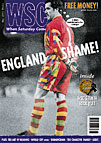 Adam Brown looks into how a group of Manchester United supporters are successfully challenging the club hierachy
Adam Brown looks into how a group of Manchester United supporters are successfully challenging the club hierachy
Victory on the pitch might be nothing new for Manchester United but victory for United’s fans certainly is. A year into their existence and the Independent Manchester United Supporters Association (lMUSA) are claiming limited success in their efforts to get Manchester United plc to take a bit more notice of their fans and to improve the stagnant Old Trafford atmosphere.
The club have recently announced: a freeze on prices for next year; the possibilities of a staggered payment scheme for season tickets; the introduction of “singing areas” (Martin Edwards: “Singing areas is in response to a number of comments made to us, not just IMUSA and we are not yet sure what or where they will actually be . . . constant standing at matches is illegal, though, so that is out of our hands”); an increase to 3,000 in the number of away fans; and an increase in size of the disabled section. Also, their seems to be support for IMUSA initiative; such as a flag day on Easter Monday and fund-raising events for a Busby memorial. “Those are things,” says Johnny Flacks of IMUSA, “taken directly from our Redprint for Change document which we asked for and which they’ve taken on board.”
Martin Edwards, in contrast, argues that the changes have been the result of “an ongoing consultation with a vast number of supporters’ clubs and individuals connected to the club. IMUSA is just one of these. They may have hundreds of members, but we have 130,000 many of whom are unhappy with IMUSA.”
These may be small steps but they do mark a significant change in direction for a club (and plc) which has for years resolutely resisted protests by supporters over a number of issues – from the redevelopment of the Stretford End, to hikes in admission prices, to conditions for travel to European games. Edwards insists that the price freeze has been a natural result of the completion of Old Trafford’s reconstruction: “We now have 55,000 seats and we want to fill them – the fans have helped to pay for the rebuilding and now is the time to relax demands on them.”
Whether they are acknowledged as the inspiration for these changes or not, they also mark a turn in fortunes for IMUSA. “I think IMUSA has been a catalyst for a lot of people,” says Flacks. “Initially we got a lot of publicity but more recently we’ve been avoiding that and approach ing the club: they’ve listened a lot more intently and we’ve developed a dialogue.”
The organization now boasts a membership over 1,000 and monthly meetings attract up to 200. This is surely down to the fact that IMUSA touched a nerve when it was formed last year: increases of up to 300% in admission costs over 5 years were forcing previously loyal fans to stay away. Combined with this was the fact that the new Old Trafford simply wasn’t the place it used to be. Seating, the destruction of the beloved Stretty and the influx of what fanzines labelled “day trippers and “glory hunters” were blamed. Genuine fans felt left out and ignored in what should have been the most satisfactory of times.
The club are, of course, unlikely to admit any such influence from IMUSA and there is the suspicion that some of these are window-dressing exercises, easy for a club which has again announced record profits. To peg prices for one season hardly represents an evacuation of the Winter Palace. “Of course, there are still a lot of issues that we want to address,” argues Flacks. “One is our away ticket allocations which we feel should take notice of genuine support rather than spending power; we also want discounted admission for 16 to 18 year olds and a better, on-going dialogue.”
Added to this are the annual (although short lived!) disagreements over travel to European games,and further improvements on ticket pricing – battles which are likely to see club and supporter on opposite sides. So has there been a shift in the balance of power at United? “No,” says Flacks, “but hopefully it shows that they are beginning to listen to the voice of supporters at last and I think that they genuinely feel that they need to get the full support of the fans behind the team.”
From WSC 111 May 1996. What was happening this month